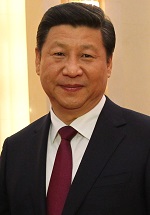 |
| Chinese president Xi Jinping |
China Daily ran a series of interviews with multinational business executives about bilateral commercial expectations as U.S. President Barack Obama hosts China's President Xi Jinping at the White House for an official state visit starting Sept. 25.
Two of the executives included Wu Xiaobin, president of Pfizer ($PFE) Investment China, and Alex Gorsky, chairman and CEO, Johnson & Johnson ($JNJ), both of whom focused on the drug approval process, but skirted the weaker yuan.
On the approval process, both noted that China has shown promise by unveiling a slew of policies aimed at cutting down a massive backlog of pending drug approval applications and working to focus on innovative therapies over the past few months.
"We applaud the recent promise by the State Council to expedite the drug approval process," Gorsky told China Daily. "This will help address the critical unmet medical needs of patients in China. The greatest challenge we face is the overwhelming number of unmet medical needs."
Wu too said the change was welcome and hoped for fast implementation.
"From a pharmaceutical industry perspective, we hope the Chinese government will further implement policies that support and encourage biopharmaceutical innovation, accelerate the approval process of new medicines, and enhance the quality of domestic generics to the international level," Wu told China Daily. "We're glad to see that the government has recently issued a series of new policies to address these."
Still, Wu noted that "we're also facing multiple market access challenges, including inconsistent policies in different provinces regarding provincial bidding and hospital level price negotiations. This presents a huge challenge for patients to get access to quality medicines."
In April, Pfizer shut its vaccines operation in China, citing a failure to get regulatory approval for a renewed import license for Prevenar.
Wu said that "Pfizer has demonstrated its commitment to improving health in China by introducing innovative drugs, partnering with local industry, conducting educational health care programs, supporting community health initiatives and actively promoting health care development." Pfizer and local firm Hisun formed the Hisun-Pfizer Pharmaceuticals company in China in September 2012.
In early August, the People's Bank of China moved to reset its daily parity rate to the dollar on Tuesday and again on Wednesday and Thursday, shocking markets with a weaker fixing and effectively widening the trading band. The currency is not fully convertible on the capital account and a steady to appreciating narrow trading band has underlain expectations for years.
"At this point, we can't comment or speculate on any potential impact the yuan depreciation has had on our financial expectations for 2015," Wu told China Daily. "What we can comment on is our commitment to China and our ongoing support for its health care reform goals."
Gorsky was similarly circumspect.
"We believe the currency rate is only one component of the business strategy. Making sure we understand the science, the overall marketplace and unmet needs, and putting all those things in the balance, is what keeps us competitive," Gorsky told China Daily.
- here's the China Daily story on Pfizer Investment China
- and the one on J&J